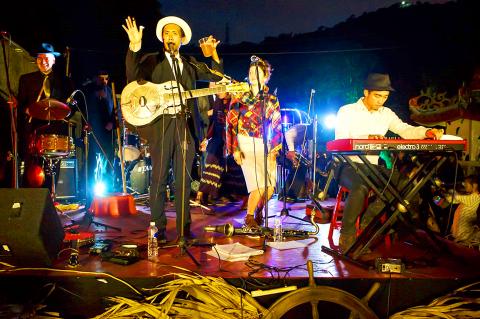Growing up in Mississippi in the ‘60s and ‘70s, blues musician Steve Gardner remembers having to don his “big leg” pants – formal attire – whenever his family went out, no matter how big or small the occasion.
“Nobody went out or played music dressed like they were going to do yard work,” Gardner, who now goes by the moniker “Rambling Steve,” tells the Taipei Times.
Currently based in Tokyo, Rambling Steve will be flying in to Taipei to play his brand of big leg acoustic and American roots and blues, alongside local bands such as the Muddy Basin Ramblers and 88Balaz at this year’s Tiger Mountain Ramble, the annual outdoor music festival featuring musicians from across Asia.

Photo courtesy of Rambling Steve
Though he picked up music at a young age, mastering the guitar when he was nine years old, and the harmonica soon after, Gardner majored in photojournalism at the University of Southern Mississippi.
“Thinking of playing music for a living back then was like planning on opening up a watermelon stand on Mars,” he chuckles.
During this time, Gardner was still known as “Little Steve.” His father, who used to improvise by making music with four kitchen knives, beating them together like they were Irish rhythm bones, was called “Big Steve.”

Photo courtesy of Craig Fergusson
It was a musician friend who suggested that Gardner call himself something other than “Little Steve” in order to differentiate himself from all the other “Steves” and “Stevies” out there. Fancying himself a good storyteller like his grandmother, he decided on “Rambling Steve.”
TOUCHING HEARTS
Having lived in Japan on and off since 1980, Rambling Steve says he’s noticed some surprisingly similar characteristics in Japan’s culture with that of the American South.

Photo courtesy of Craig Fergusson
Both cultures, Rambling Steve explains, “are very guilt motivated” and possess “an exaggerated sense of pride coupled with guilt and inferiority that is designed to keep everyone in their place.”
Living in Japan, he adds, has only solidified his resolve to continue on the path he set forth from the beginning — sharing stories about life and about where he’s from, through the blues.
His time abroad, he muses, “has given me the perspective of distance to focus on my roots, my life, along with the hard history that defines the American South.”
Along the way, Rambling Steve has also managed to touch a few lives. For the 11 years that he played acoustic at a Tokyo club, he noticed at almost every show, a young mother with her two sons in the audience.
Years later, he was playing at a concert to raise money for the March 2011 earthquake and tsunami that hit Japan when he spotted the mother, now with gray hair, and her grown-up sons in the audience. She approached him and said that after her husband passed away, Rambling Steve’s live shows were the only thing her sons showed interest in and that they were both musicians now, dabbling in rag time and jug band music.
“She told me, ‘Your music kept me from losing my mind. It kept our small family together.’”
SHARING STORIES
For Rambling Steve, that’s what the blues is all about — opening up and sharing your sorrows and joy and in the process of doing so, striking a chord in other people.
“The blues is a song of pain from living too long coupled with a wink and crooked smile of knowing that it wasn’t all bad.” Rambling Steve explains.
He says the best part of visiting home is always hearing the stories of his family and friends. On Sundays, the men would go camping, and after dinner, they would gather around to tell stories. A common tale was about “the one that got away.”
“Most of the stories they told were not about hunting deer, but hunting ‘dear!’” Rambling Steve chuckles.
His father, grandpa and uncle told stories too: “Every blues man that I have ever met worth a damn was an over-flowing faucet of stories.”
Rambling Steve says he only has one wish when he’s long gone and when all that’s left of him is his music: That “folks might remember me and say, ‘He was the real deal and he sure could tell a good story.’”

The canonical shot of an East Asian city is a night skyline studded with towering apartment and office buildings, bright with neon and plastic signage, a landscape of energy and modernity. Another classic image is the same city seen from above, in which identical apartment towers march across the city, spilling out over nearby geography, like stylized soldiers colonizing new territory in a board game. Densely populated dynamic conurbations of money, technological innovation and convenience, it is hard to see the cities of East Asia as what they truly are: necropolises. Why is this? The East Asian development model, with

This is a deeply unsettling period in Taiwan. Uncertainties are everywhere while everyone waits for a small army of other shoes to drop on nearly every front. During challenging times, interesting political changes can happen, yet all three major political parties are beset with scandals, strife and self-inflicted wounds. As the ruling party, the Democratic Progressive Party (DPP) is held accountable for not only the challenges to the party, but also the nation. Taiwan is geopolitically and economically under threat. Domestically, the administration is under siege by the opposition-controlled legislature and growing discontent with what opponents characterize as arrogant, autocratic

June 16 to June 22 The following flyer appeared on the streets of Hsinchu on June 12, 1895: “Taipei has already fallen to the Japanese barbarians, who have brought great misery to our land and people. We heard that the Japanese occupiers will tax our gardens, our houses, our bodies, and even our chickens, dogs, cows and pigs. They wear their hair wild, carve their teeth, tattoo their foreheads, wear strange clothes and speak a strange language. How can we be ruled by such people?” Posted by civilian militia leader Wu Tang-hsing (吳湯興), it was a call to arms to retake

When Lisa, 20, laces into her ultra-high heels for her shift at a strip club in Ukraine’s Kharkiv, she knows that aside from dancing, she will have to comfort traumatized soldiers. Since Russia’s 2022 invasion, exhausted troops are the main clientele of the Flash Dancers club in the center of the northeastern city, just 20 kilometers from Russian forces. For some customers, it provides an “escape” from the war, said Valerya Zavatska — a 25-year-old law graduate who runs the club with her mother, an ex-dancer. But many are not there just for the show. They “want to talk about what hurts,” she